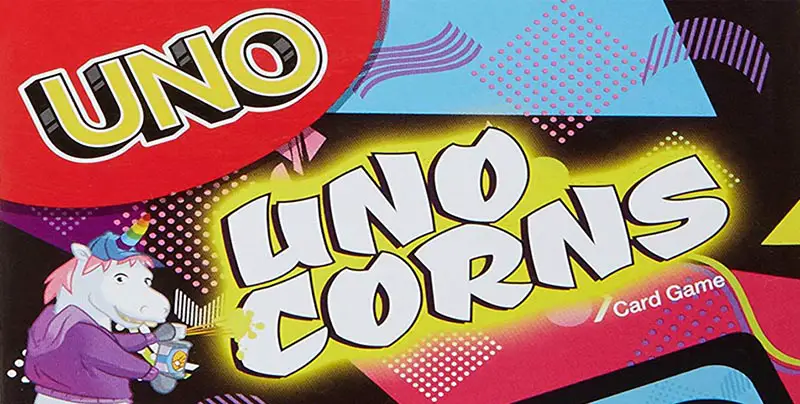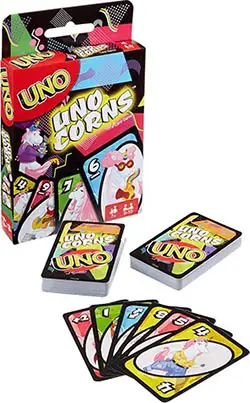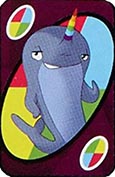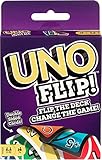

Components
- 19 Blue cards - 0 to 9
- 19 Green cards - 0 to 9
- 19 Yellow cards - 0 to 9
- 19 Pink cards - 0 to 9
- 8 Draw Two cards - 2 each in blue, green, yellow and pink
- 8 Reverse cards - 2 each in blue, green, yellow and pink
- 8 Skip cards - 2 each in blue, green, yellow and pink
- 4 Wild cards
- 4 Wild Draw Four cards
- 4 Wild Narwhal Rule cards
- Rulebook
Object of the Game
Be the first player to get rid of all of your cards in each round and score points for the cards your opponents are left holding. Points in rounds accumulate and the first player to reach 500 points wins.
Setup
Each player draws a card; the player that draws the highest number deals (count any card with a symbol as zero).
The dealer shuffles and deals each player 7 cards.
Place the remainder of the deck facedown to form a draw pile.
The top card of the draw pile is turned over to begin a discard pile.
Game Play
The person to the left of the dealer starts play.
On your turn, you must match a card from your hand to the card on the top of the discard pile, either by number, color or symbol (symbols represent Action Cards.
f you don't have a card that matches the one on the discard pile, you must take a card from the draw pile. If the card you picked up can be played, you are free to put it down in the same turn. Otherwise, play moves on to the next person in turn.
You may also choose NOT to play a playable card from your hand. If so, you must draw a card from the draw pile. If playable, that card can be put down in the same turn, however you may not play any other card from your hand after the draw.

Action Cards

Draw Two Card
When you play this card, the next player must draw 2 cards and miss their turn.
This card may only be played on a matching color or on another Draw Two card. If turned up at the beginning of play, the same rule applies.

Reverse Card
When you play this card, the direction of play reverses (if play is currently to the left, then play changes to the right, and vice versa). This card may only be played on a matching color or on another Reverse card.
If this card is turned up at the beginning of play, the dealer goes first, then play moves to the right instead of the left.

Skip Card
When you play this card, the next player is "skipped" (loses their turn). This card may only be played on a matching color or on another Skip card.
If a Skip card is turned up at the beginning of play, the player to the left of the dealer is "skipped", hence the player to the left of that player starts play.

Wild Card
When you play this card, you get to choose the color that continues play (any color including the color in play before the Wild card was laid down).
You may play a Wild card on your turn even if you have another playable card in your hand.
If a Wild card is turned up at the beginning of play, the person to the left of the dealer chooses the color that continues play.

Wild Draw 4 Card
When you play this card, you get to choose the color that continues play PLUS the next player must draw 4 cards from the draw pile and lose their turn.
However, there is a hitch! You may only play this card when you do NOT have another card in your hand that matches the COLOR on the discard pile (but it is acceptable to play this card if you have matching number or Action Cards).
If turned up at the beginning of play, return this card to the deck and pick another card.
Note: If you suspect that a Wild Draw 4 card has been played on you illegally (i.e. the player has a matching card), then you may challenge that player. The challenged player must show you (the challenger) their hand.
If guilty, the challenged player must draw the 4 cards instead of you. However, if the challenged player is innocent, you must draw the 4 cards PLUS an additional 2 cards (6 total)!

Wild Narwhal Rule Card
When you play this card, all players in order must draw a card from the Draw Pile and stick (or hold) it to their forehead without looking at it! Then, on their turn, they must correclty guess the color of the card.
If the card is a wild card (Wild, Wild Draw 4, Wild Narwhal) ANY COLOR they guess is correct. If the player successfully guesses the color of their card, they discard the card and then proceed to play their turn as normal.
If they do not guess correctly, their turn is over and they must wait until their next turn to try again. You may not proceed until you have correctly guessed the color of the card.
This card is also a wild card, so the player who played it chooses a color that resumes play. If this card is turned up at the beginning of play, the person to the left of the dealer chooses the color that begins play.
Going Out
When you play your next-to-last card, you must yell "UNO" (meaning "one") to indicate that you have only one card left. If you don't yell "UNO" and you are caught before the next player begins their turn, you must draw two cards.
Once a player has no cards left, the round is over. Points are scored and play starts over again.
If the last card played in a round is a Draw Two or Wild Draw Four card, the next player must draw the 2 or 4 cards respectively. These cards are counted when the points are totaled.
If no player is out of cards by the time the draw pile is depleted, the discard pile is reshuffled and play continues.
Scoring
The first player to get rid of their cards in a round receives points for all of the cards left in their opponents' hands as follows:
- All number cards (0-9): Face Value
- Draw Two: 20 Points
- Reverse: 20 Points
- Skip: 20 Points
- Wild: 50 Points
- Wild Draw Four: 50 Points
- Wild Narwhal Rule: 50 Points
Once the score for the round has been tallied, if no player has reached 500 points, reshuffle the cards and begin a new round.
End of the Game
The winner is the first player to reach 500 points.
Alternative Scoring And Winning
Another way to score points is to keep a running tally of the points each player is left with at the end of each round. When one player reaches 500 points, the player with the lowest points is the winner.
Other Uno Games
- UNO Angry Birds
- UNO Attack
- UNO Blast
- UNO Boom-o
- UNO BTS
- UNO ColorAdd
- UNO Emoji
- UNO Dare
- UNO Dice
- UNO Chicago Cubs
- UNO Flash
- UNO Flip
- UNO Frozen II
- UNO Harry Potter
- UNO Minecraft
- UNO Monster High
- UNO MOD
- UNO Moo
- My First UNO
- UNO Original
- UNO Power Grab
- UNO Roboto
- UNO Royal Revenge Game
- UNO The Lion King
- UNO Spin
- UNO Splash
- UNO Stacko
- UNO Super Mario
- UNO Tippo
- UNO Wild Jackpot
Continue Reading


